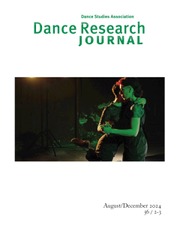Article contents
Choreographing Postcoloniality: Reflections on the Passing of Edward Said
Published online by Cambridge University Press: 22 July 2014
Extract
Nearly twenty years ago, I took a graduate seminar on postcolonial theory with Edward Said in the Department of Comparative Literature at Yale University. It was a heady experience: competitive grad students and young faculty members vied for his imperious (I realize the irony of the word in reference to Said!) attentions. We read novels—potent, searing, difficult novels—alongside some of the theorists of political struggle who would indelibly alter my understanding of what cultural resistance could mean. Said's recent death, which of course coincided with a period of distressing shifts in political tides, has placed pressure on those of us engaged with cultural analysis to probe even more deeply the significance of anticolonial struggle in cultural forms. As a dance scholar, I have found myself reflecting on the ways in which postcolonial theory might inform my understanding of the power of choreography to affect political change—but also on the ways in which dance can inform our readings of postcolonial theory.
- Type
- Articles
- Information
- Dance Research Journal , Volume 36 , Issue 1: 35/2 Winter 2003 & 36/1 Summer 2004 , Summer 2004 , pp. 164 - 169
- Copyright
- Copyright © Congress on Research in Dance 2004
References
Works Cited
- 2
- Cited by


